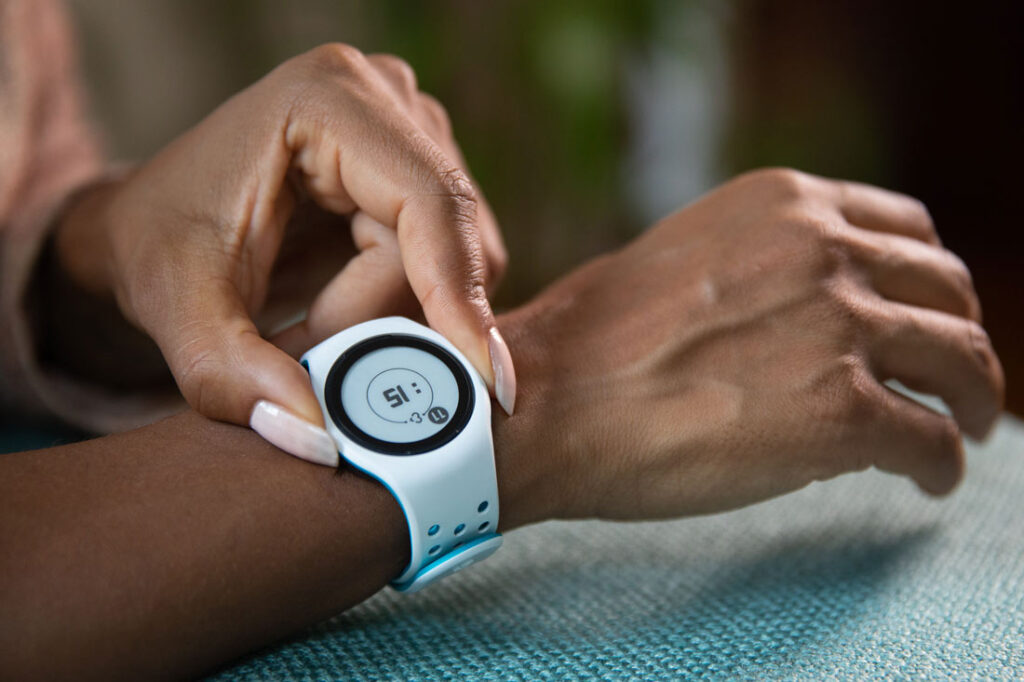The digital health world as we know it today is booming—with products, artificial intelligence advancements and competition. But, back in the ’90s, there was much less wearable technology that could give you continuous information about your health. You went to the doctor, got blood drawn and had tests run. In between visits, you lived in the unknown.
In 1991, Rosalind Picard was a savvy electrical engineer and recent Massachusetts Institute of Technology doctoral graduate. She was ready to take on the technology world. Already, Picard knew she wanted to create technology that helped people. She started designing computers and became interested in how the human brain works to build better computers. She wanted to build an intelligent device that could make sense of the world like people do and began to focus particularly on memory and attention. Picard did not want to be associated with studying emotion because she wanted to be taken as seriously as possible.
“I started to try to get men to work on it because I figured, as a woman, it would ruin my career,” Picard says. “But that didn’t happen. I just tried to bring rigorous engineering measurement methods to it. And, in the course of doing that, it led me to a lot of different things we can measure in the human body, which led me not just to measurement of emotion but to its interactions with health.”
Professor Rosalind Picard founds Empatica, Embrace and Affectiva
Six years later, Picard—MIT professor and TED Talk speaker—wrote a highly influential book about, and subsequently developed, affective computing: an entire field of study dedicated to systems and devices that can recognize, interpret, process and simulate human emotions.
These internet-connected devices not only include desktops and laptops but our phones and wearables as well, says Picard, founder and director of the MIT Media Lab’s affective computing research group.
Out of this new field of study, Picard co-founded two companies. One of them, Affectiva, aims to create tech that measures human emotion. “The idea behind Affectiva was to try to help companies that were asking for our technology to get it in an honest, ethical way,” she says. “I did not want companies spying on people without their knowing…. So, we tried very hard to get things out there in a form that helped improve people’s lives.”
Picard’s other company, Empatica—Italian for “empathetic”—is focused on building the highest-quality medical devices and FDA-cleared smartwatches, as well as providing data for clinical research and science advancements for health. One of Empatica’s wearables, Embrace, is the first-ever AI-based smartwatch with FDA clearance for seizure monitoring.
“There are a lot of apps out there that detect shaking, but they have a high false alarm rate,” Picard says. “By doing it the way we do it with the AI inside Embrace, it has passed the FDA clearance not only for sensitivity for accurately detecting seizures but the specificity of having a low false alarm rate.… The data quality is [also] better than anything you’d get from the top-of-the-line consumer smartwatches because the focus of this is not on running 30-something apps on your wrist…. It prioritizes clinical-quality data.”
The diverse applications of the Empatica Embrace smartwatch
Whereas Embrace is sold directly to consumers who have a prescription from their doctor, EmbracePlus, a more specialized wearable, is used in hundreds of clinical trials and sold to researchers, clinicians, hospitals and academics. If a pharma company uses EmbracePlus in a drug trial, for example, they can better determine if their drug is working for people or if there are unwanted side effects impacting people’s sleep or activity. EmbracePlus objectively quantifies those behavioral pieces of information, stress level-related information and other physiological biomarkers that are important to the trial. This helps pharma researchers be more accurate in their findings.
The original Embrace wearable for consumers is helpful for many issues but particularly epilepsy. Today, 1 in 26 people in America will develop epilepsy in their lifetime, according to Picard. She and her team built Embrace to collect data because there’s very little funded research surrounding epilepsy, and they wanted to uncover better science on the condition. Their data has been used by Mayo Clinic and others to show improved forecasting of seizures, and Picard believes that new insights may eventually lead to forecasting migraines and panic attacks, too.
Seizures don’t just occur when someone is awake, and this is one reason Embrace is invaluable to someone with epilepsy. “If you’re having a bunch of them while you’re asleep and you don’t know it, which is possible, that could be deadly,” she says. “How do you let your doctor know if you’re asleep and you don’t know? The devices can help people see if they really have hit zero with these kinds of seizures. That’s important for peace of mind, for your health.”
Rosalind Picard’s unique technology is revolutionizing digital health
Beyond epilepsy, Picard’s emotionally intelligent wearable can help people see changes in their overall health—including their physical activity, heart rate, stress and sleep. Disrupted sleep, she says, is one of the vital things to fix if you want to improve your mental and physical health. The data Embrace gathers helps fill in your memory gaps when you go see your doctor because it’s always on.
“For digital health, I’m super excited about this long-term continuous data,” she says. “We’re really excited to be a part of this revolution. I think it’s just the beginning. I think it has the potential to revolutionize health.”
The data that these AI-driven wearables are collecting excites Picard because it has the potential to be preventive in the mental health space, not just indicative. Through the technology, she and her team are working to help people improve their mental health and fill their “positive emotion bank account” before a major life stressor hits so they don’t experience a breakdown when that occurs. And she’s changing lives in the process.
“My greatest pride comes when I hear of our technology not only improving people’s lives,” she says, “but actually, in some cases, helping save somebody’s life.”
This article originally appeared in the January/February 2024 issue of SUCCESS Magazine. Photo courtesy of Empatica.



